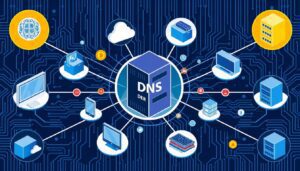What happens when you change your DNS To 8.8.8.8?. In the contemporary world, the Domain Name System (DNS) is vital to our internet visibility. It conversions domain names (such as www.example.com) into numbers that computers can use. You choose a new server to find these names, not your router or ISP, when you change to Google’s 8.8.8.8 DNS.
Using Google’s DNS, 8.8.8.8, could improve the pace, dependability and security of your perusing. However, it’s essential to understand how this change will affect your internet usage. We’ll go into Google’s DNS, what happens when you switch, and what to consider about.
Crucial Lessons
- Changing to research’s public DNS administration from your default DNS supplier is essential for refreshing your DNS to 8.8.8.8.
- Among the potential advantages are quicker web associations, further developed security, and more solid DNS goal.
- Understanding the ramifications and possible downsides of using Google’s DNS, for example, protection and security concerns, is fundamental.
- Cautiously consider your choices prior to rolling out the improvement to guarantee it meets your specific necessities and inclinations.
- An exhaustive way to deal with web network ought to consider contingency plans and substitute DNS suppliers.
Grasping the Public DNS Administration of Google 8.8.8.8
The 8.8.8.8 public DNS server from Google is a well known choice. It delivers better performance and security. Launched in 2009, it features a unique setup that separates apart from other DNS providers.
The History Behind Google’s DNS Implementation
Google wanted to make the internet better. They saw the need for a reliable DNS system. So, they launched 8.8.8.8 to fix the old DNS’s problems.
How Google DNS Infrastructure Works
Google’s DNS uses a network of servers worldwide. This setup ensures fast and reliable DNS resolution. Because to its sophisticated caching and load-balancing, it can also manage enormous traffic volumes.
Essential Elements of 8.8.8.8
- Fast and reliable DNS resolution
- Enhanced security features, including protection against DNS-based attacks
- Transparent and user-friendly interface for easy configuration
- Support for a wide range of devices and operating systems
Learning about google public dns explained and benefits of using google dns helps users decide. It shows why switching to this service can be a good move.
What Happens On the off chance that You Change to 8.8.8.8 as Your DNS?
Changing your DNS to 8.8.8.8 can altogether influence how you utilize the web. Google’s A free public DNS service has numerous advantages. But by knowing how it works, you can decide if it’s healthy for you.
Your gadget will send DNS solicitations to find out a bout’s servers assuming that you change to 8.8.8.8. Utilizing the DNS settings on your ISP isn’t equivalent to this. Google’s servers are built to handle lots of traffic fast, making DNS resolution quicker and more reliable.
You might notice your browsing speed gets better right away. Google’s DNS servers are set up for fast responses. This means websites load faster, especially if your ISP’s DNS was slow.
Also, using 8.8.8.8 can make your online experience safer. Google’s DNS service supports DNSSEC and encrypted DNS protocols. These features help protect against DNS attacks and boost your internet security.
However, switching to 8.8.8.8 may have different effects. Your location, your ISP, and other variables all have a role. While some people will see significant improvements in their internet, others won’t see any change at all.
Your needs and the performance of your DNS at the moment will determine if you should move to 8.8.8.8. Think about the benefits and what you need from your internet. This will help you in deciding if shifting is the best direction of activity for you.
Benefits of Using the Public DNS of Google
Utilizing 8.8.8.8, Google’s public DNS, enjoys a few benefits. It improves consumers’ surfing experiences and maximizes network performance. Google’s DNS offers fast speeds and strong security, making it a great choice.
Improved Browsing Speed and Performance
Google’s public DNS makes browsing faster and more efficient. It quickly resolves DNS queries, cutting down on website loading times. This results in a smoother and more responsive internet experience.
Enhanced Security Features
Using Google’s DNS also adds security. Google’s servers use advanced threat detection to block malicious sites and phishing attempts. This gives users peace of mind while online.
Better DNS Resolution Reliability
Reliability is another big plus of switching to Google’s public DNS. Google’s vast global network and redundant servers ensure reliable DNS resolution. This means fewer downtimes and a more consistent internet experience.
Users benefit from improved security, dependable DNS, and quicker browsing when they utilize Google DNS. This improves their overall network performance and internet experience.
A Complete Guide on DNS Configuration Modification
Switching to Google’s 8.8.8.8 DNS settings is easy and offers many advantages. You will experience faster browsing and improved security. Whether you’re using Windows, macOS, iOS, or Android, this is the method for changing your DNS to 8.8.8.8 and experience the qualification.
Windows
- In the wake of getting to the Control Board, go to “Organization and Web”.
- Select “Change adapter settings” after selecting “Network and Sharing Center”.
- Select “Properties” with a right-click on the dynamic organization association.
- Select “Web Convention Variant 4 (TCP/IPv4)” by looking down.
- Select “Utilize the accompanying DNS server addresses” subsequent to tapping the “Properties” button.
- Click “Alright.” Resulting to picking “8.8.8.8” as the inclined toward DNS server and “8.8.4.4” as the support DNS server.
macOS
- Select Framework Inclinations from the Apple menu.
- To see the ongoing organization association, click the Organization symbol.
- After choosing Advanced, select the DNS tab.
- Press the “Add” button in the DNS Servers segment and type 8.8.8.8 and 8.8.4.4.
- To save your modifications and exit the Network settings, click OK.
Making the move to 8.8.8.8 DNS will provide you with quicker and more dependable internet. Better security for your online activities will also be provided.
Typical Problems After Using 8.8.8.8
There are various benefits to utilizing Google’s public DNS administration, 8.8.8.8. But, it might also cause some common problems. Let’s examine the most prevalent problems and their solutions.
Solving Issues with Connections
Slow or sporadic internet is a prevalent problem following the transition to 8.8.8.8. Numerous factors can cause this. These include network congestion, old network drivers, or DNS conflicts. Here are some steps to troubleshoot these problems:
- Flush your DNS cache to clear outdated or conflicting info.
- Make that the essential DNS server on your organization connector is 8.8.8.8.
- Confirm whether antivirus or firewall programming is forestalling the 8.8.8.8 association.
- For another beginning, take a stab at resetting your switch or modem.
Resolving Cache-Related Issues
Users might also face website caching issues. This happens when websites don’t load correctly or show old info. This is often due to how 8.8.8.8 handles DNS caching. Here are some solutions:
- Clear your internet browser’s store and treats.
- Impair program expansions or modules that may be causing issues.
- Flush your DNS cache to use the latest DNS info.
Resolving Security Issues
A few clients are worried about the security of 8.8.8.8, in spite of the way that it is believed to be secure. To address these concerns, you can:
| Concern | Solution |
|---|---|
| Privacy and Data Collection | Check Google’s privacy policy and data handling to see if it meets your standards. |
| DNS-based Attacks | Use a VPN or DNS-based firewall to protect against DNS attacks. |
By tackling these common issues, you can make the switch to 8.8.8.8 smooth and enjoy its benefits.
Impact on Internet Speed and Performance
Using Google DNS can significantly enhance your network performance, often leading to faster internet speeds. The widely recognized public DNS service, 8.8.8.8, is known for its ability to improve browsing efficiency by reducing latency and speeding up DNS resolution times.
Using Google’s DNS can also make content delivery faster. Google’s vast global network helps your device quickly find domain names. This means reduced page load times and a smoother browsing experience.
Google’s DNS servers are also super fast, often beating your ISP’s DNS services. This leads to quicker access to online content. You’ll find your internet experience more responsive and productive.
Also, Google’s DNS can help content delivery networks (CDNs) perform better. By directing your requests through Google’s DNS, you get faster content from CDNs. This boosts your internet connection’s speed and responsiveness.

“Switching to Google DNS can significantly improve your internet speed and overall browsing experience.”
However, the amount of boost you receive is determined by a variety of factors. Your location, internet service provider, and the websites you browse all have an impact. However, upgrading your network with Google DNS is a simple and practical technique to potentially improve your internet speed and performance.
Security Implications of Using Google DNS
There are benefits and inconveniences to utilizing 8.8.8.8, Google’s public DNS administration. It improves browsing speed but increases privacy and data use concerns. It’s important to know about these points.
Privacy Considerations
Using Google DNS might make you worry about your privacy. Google sees what websites you visit because your traffic goes through their servers. They say they make the data anonymous, but how much is still a debate.
Protection Against DNS-Based Attacks
However, Google public DNS explained can also protect you from some DNS attacks. These include DNS spoofing and hijacking. Google’s strong security can help keep you safe, adding to the benefits of using google dns.
Data Collection Practices
Google collects data from its DNS service too. They might use your browsing history and IP address for ads and improving services. If you’re worried about privacy, you might look for other DNS services or use privacy tools.
In short, using Google DNS has both good and bad sides. You must determine whether the advantages outweigh the privacy and data issues. Before selecting Google’s public DNS service, be sure you understand what you’re getting into.
A Comparison of Other DNS Providers with 8.8.8.8
Switching to 8.8.8.8 for your DNS is a big move. Understanding how it stacks up against other DNS providers is essential. While Google’s public DNS service is popular, there are other solutions available. Each has its own unique qualities and benefits.
The version 1.1.1.1 from Cloudflare is a formidable rival. It emphasizes security and privacy. It promises to safeguard your data better and be faster than 8.8.8.8. Cisco’s OpenDNS is excellent for schools and families. It contains numerous web filters and parental settings.
| DNS Provider | Speed | Security | Features |
|---|---|---|---|
| Google DNS (8.8.8.8) | Fast | Good | Reliable, widely adopted |
| Cloudflare DNS (1.1.1.1) | Very Fast | Excellent | Focuses on privacy and security |
| OpenDNS | Good | Good | Parental controls, web filtering |
Take speed, security, and features into consideration before updating your DNS to 8.8.8.8 or exploring other choices. What you most require will determine the best option. Do you prefer more web controls, better privacy, or the fastest service?

Keep in mind, changing to 8.8.8.8 DNS is only one piece of improving your web-based insight. Taking a gander at other DNS suppliers can assist you with tracking down the best met for your requirements. You’ll get the assurance and execution you need.
Alternative DNS Options and Backup Solutions
8.8.8.8, Google’s DNS service, is excellent for speeding up your network. But, it’s smart to look at other DNS options and have backup plans. This part talks about other DNS services and how to set up backup DNS servers for better reliability.
Popular DNS Alternatives
Beyond Google’s 8.8.8.8, there are several DNS services available. Here are a few popular ones:
- 1.1.1.1 and 1.0.0.1 of Cloudflare: These DNS servers prioritize privacy and are quick and safe.
- Cisco’s OpenDNS gives extra abilities including phishing security and content screening.
- Quad9: A non-benefit administration that focuses on security and protection by hindering known malevolent sites.
Setting Up Secondary DNS Servers
It’s also important to have backup DNS servers. This ensures your network works even if the main DNS server fails. Here’s how to set up a secondary DNS server:
- Choose a trustworthy secondary DNS provider, like one mentioned above.
- Set up your organization gadgets, similar to switches or PCs, to utilize the optional DNS server’s IP address as a reinforcement.
- Test the auxiliary DNS server by switching off the principal one and checking assuming your organization actually works.
- Keep an eye on how well both DNS servers work to make sure your network is always fast and reliable.
Having a strong DNS strategy with backup servers makes your network more reliable. This means you can enjoy a smooth online experience, even when there are problems.
| DNS Provider | Key Features | Pricing |
|---|---|---|
| DNS by Google (8.8.8.8) | Quick, dependable, and cost-free | Free |
| DNS for Cloudflare (1.1.1.1) | focused on privacy, quick, and free | Free |
| OpenDNS | Phishing defense and content filtering | Both paid and free plans |
| Quad9 | focused on security and prevents harmful domains | Free |
Conclusion
What occurs if your DNS is changed to 8.8.8.8? There are numerous advantages to switching your DNS to Google’s public service at 8.8.8.8. You might see faster browsing speeds and better performance. It also adds extra security and reliable DNS resolution.
Switching to 8.8.8.8 can affect you differently, depending on where you are and your internet setup. It usually makes web browsing quicker and protects against some DNS attacks. However, consider the security and privacy implications of utilizing a large tech company like Google for your DNS.
What matters most to you will determine whether you use Google’s public DNS or explore alternative solutions. Compare the advantages of utilizing Google DNS with the consequences of switching to 8.8.8.8. This will assist you in selecting the finest option for your online requirements and maintain the security and effectiveness of your internet use.
FAQ
What is Google’s Public DNS administration 8.8.8.8?
8.8.8.8, one more name for Google’s public DNS administration, is a free help. Google offers this world Space Name Framework (DNS) resolver. It fills in as a substitute for the DNS servers that web access suppliers (ISPs) offer. It can work on the speed, unwavering quality, and security of your web perusing.
What benefits does using research’s public DNS 8.8.8.8 deal?
Assuming you utilize Google’s public DNS 8.8.8.8, you can peruse all the more rapidly. Also, it gives reliable DNS goal and improved security. Your web speed can be improved and DNS assaults can be forestalled with Google’s broad worldwide organization of DNS servers.
How should I revive my DNS to 8.8.8.8?
It’s quite easy to change your DNS settings to 8.8.8.8. The methods differ dependent upon your functioning structure and contraption. Generally, your organization or web settings contain the DNS settings. Fundamentally set the significant DNS server to 8.8.8.8.
What possible problems could I run into after making the transition to 8.8.8.8?
Usually, the transition to 8.8.8.8 is seamless. However, you may experience short-term cache or connection troubles. You can resolve these by changing your firewall settings or clearing the DNS cache.
What impacts does 8.8.8.8 have on my web execution and speed?
Google’s public DNS 8.8.8.8 can work on the speed and usefulness of your web. It makes benefit of Google’s overall DNS servers. Better CDN execution, lower idleness, and faster DNS goal can result from this. You’ll presumably have a superior perusing experience.
What security and privacy issues arise while using Google DNS 8.8.8.8?
Although Google’s public DNS has security advantages, privacy issues are brought up. Data from DNS queries is gathered by Google and may be utilized for advertisements. Google, however, safeguards user privacy. If privacy is an issue, users might also investigate alternative DNS providers.
How does 8.8.8.8 contrast from other notable DNS suppliers?
As much as practical, OpenDNS and Cloudflare’s 1.1.1.1 vary from Google’s public DNS 8.8.8.8. Each enjoys benefits and inconveniences of its own. Speed contrast, security, insurance, and features. Clients ought to put together their choices with respect to their inclinations and necessities.
What backup plans and DNS alternatives are there to 8.8.8.8?
Other DNS alternatives to Google’s 8.8.8.8 include OpenDNS and Cloudflare’s 1.1.1.1. DNS servers offered by ISPs are also accessible. Having backup DNS servers is a smart idea for dependable internet access.







4 thoughts on “What Happens When You Change Your DNS To 8.8.8.8?”